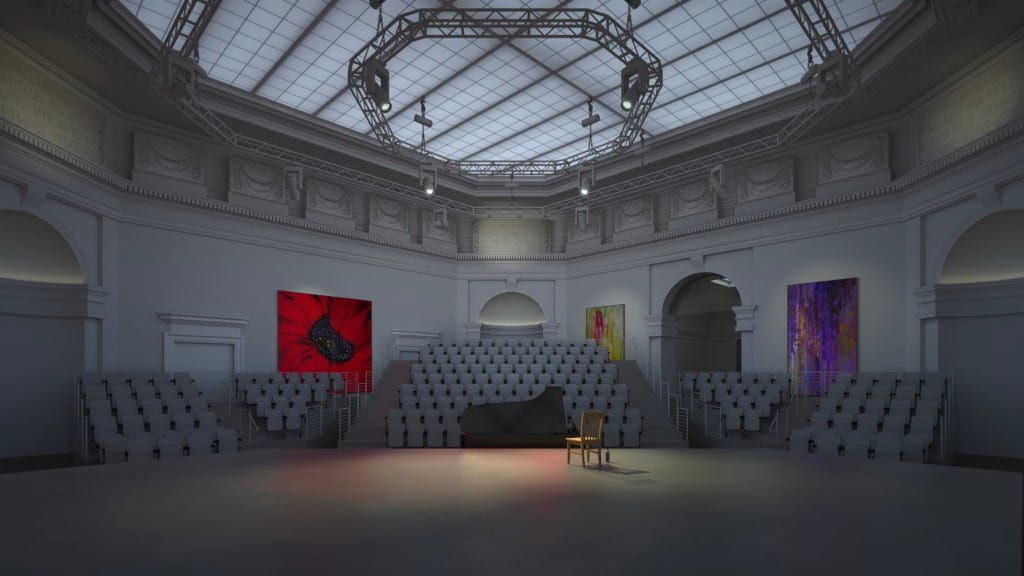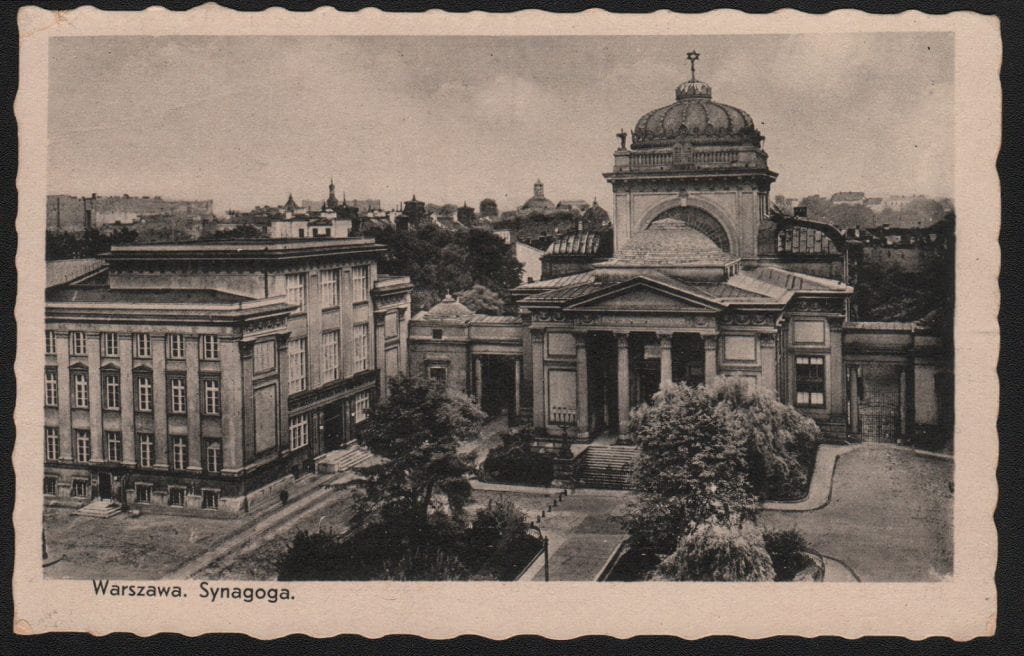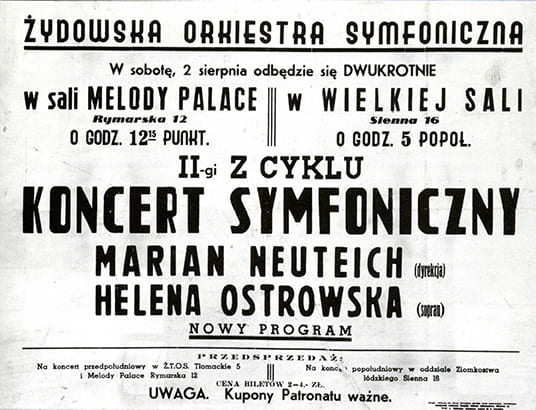Rise Up & Resist was the official name for a concert commemorating the eightieth anniversary of the Warsaw Ghetto Uprising, held in San Francisco on April 28. Sponsored by Tad and Dianne Taube and Taube Philanthropies, the program featured music by Ludwig van Beethoven, David Beigelman, Ernest Bloch, Frederic Chopin, Albert Harris, Szymon Laks, Dmitry Pokrass, Karol Szymanowski, Aleksander Tansman, Henryk Wars, and Mieczysław Weinberg. Held at the San Francisco Opera’s Dianne and Tad Taube Atrium Theatre at on April 28, this exceptionally moving event was conceived and curated by Gregory Henkel, Managing Artistic Director of the SFO.

The carefully chosen musical selections were closely tied to and paid homage to the artistic life inside the Warsaw Ghetto, whose inhabitants rose up against the Nazi oppressors on 19 April 1943. It was the first major civilian rebellion in Nazi-occupied Europe, and the largest and most tragic act of resistance by Jews during World War II. Lasting four weeks and filled with acts of incredible bravery by Jews who faced systematic burning and ruthless bombardment of their dwellings block by block, the casualties included over thirteen thousand dead and over fifty thousand survivors who were later sent to the Majdanek and Treblinka death camps.
The ending of the Ghetto Uprising came on 16 May 1943, when the Nazis dynamited the Great Synagogue at Tłomackie Street in central Warsaw. Opened in 1878 and recognized as the largest house of Jewish worship in the world, it was renowned for its tradition of excellent liturgical music and held countless concerts throughout the decades that this imposing temple served Warsaw’s vibrant Jewish population.

A Concert of Commemoration
Fittingly, the Rise Up & Resist program in San Francisco directly referred to the music heard not only at the Tłomackie Synagogue but also in other gathering places throughout the Warsaw Ghetto and elsewhere in the capital. Thus, the religious song, Ani Ma’amin with Hebrew texts of the Thirteen Articles of Faith and Zog nit keynmol, the Yiddish hymn of the Jewish Partisans, shared the pride of place on the April 28 commemorative concert with popular songs from the 1930s. These popular songs were by such composers as David Beigelman, Albert Harris, and Henryk Wars and were heard daily in Warsaw’s cafes, theatres, music review and dinner clubs of the era.
Another moving work on the program was Chopin’s Nocturne in c-sharp minor, which was performed by pianist Władysław Szpilman live on Radio Warsaw during the intense bombardment of Warsaw in September 1939, and later when he was discovered hiding in an abandoned apartment by an SS officer in Warsaw in 1944. This deeply reflective work followed the recitation of Kaddish by rabbi Stephen Pearce. Just as poignant was the choice of Szymanowski’s La Fontaine d’Aréthuse for violin and piano; it was one of the selections heard at the Jewish Symphony Orchestra’s last concert in the Ghetto on April 12, just one week before the Uprising.

Source: Jewish Historical Institute, Emanuel Ringelblum Archive. Reprinted in Okupacyjne losy muzykow: Warsaw 1939-145, Vol II, p. 101.
Weinberg’s Aria, Op. 9 for string quartet and Seven Yiddish Songs as well as Tansman’s Mazurka for Solo Guitar, Laks’s String Quartet on Polish Themes, and Bloch’s Prayer for Clarinet and Piano, rounded off the San Francisco Opera program. The evening’s grand and extraordinarily moving close was delivered by all present at the concert, who joined in singing Beethoven’s Ode to Joy to the Yiddish text by Itzhok Lejb Peretz.
The vocal artists appearing in the April 28 concert included sopranos Arianna Rodriguez, Mikayla Sager, and Olivia Smith, mezzo-sopranos Gabrielle Beteag, and Nikola Printz, tenor Moisés Salazar, and bass-baritone Jongwon Han. The participating instrumentalists included violinists Kay Stern and Jeremy Preston, violist Joy Fellows, cellist Thalia Moore, clarinetist José González Granero, pianists Yang Lin, Ronny Michael Greenberg, Carrie-Ann Matheson and Marika Yasuda, guitarist David Tanenbaum, and accordionist Ron Borelli. The traditional Kaddish prayer was recited by Stephen Pearce, Senior Rabbi Emeritus at the Congregation Emanu-El.
“Music Gave Voice…”
In his introductory remarks before the concert, Matthew Shilvock—the Tad and Dianne Taube General Director of the San Francisco Opera—spoke of “… the many layers of cultural meaning that connected people in the Ghetto.” He added the following:
“Music connects us through emotion and, in the Ghetto, music gave voice to things that could not otherwise be shared. It harkened back to a world that had been brutally upended, kept alive tradition and ritual, kept alive hope, provided solace and an escape from brutality, expressed resistance, and brought together people in joy.”
In turn, Tad Taube spoke of his and his family’s narrow escape from Poland on the eve of the German invasion in 1939. He paid a moving tribute to the heroic men and women of the Warsaw Ghetto who rose up against the Nazi death machine by saying, “On the brink of destruction, these Jews decided that if they had to die, they would do so on their own terms. As the proclamation announcing their intention to take up arms acknowledged: “All of us will probably perish in the fight, but we will never surrender!”
Closing his remarks, Tad Taube shared the news that the U.S. Congress announced its plan to establish the Heroes of the Warsaw Ghetto Congressional Gold Medal to honor the participants in the Uprising, also noting that, “Contrary to the hope of the Nazis to eradicate the Jewish presence, the Warsaw Uprising has become a rallying point for efforts to preserve and cherish it.”
[Sources: SFO press release, taubephilanthropies.org; Postcard image of Great Synagogue and Jewish Symphony Orchestra program: jhi.pl]
